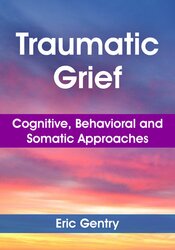

Loss is hard. Grief is hard. The challenge of accommodating loss and mitigating the strong feelings of grief is difficult with any loss in our lives. However, it can be significantly compounded when the loss is traumatic and unexpected. Loss of a loved one to a traumatic experience such as an acute illness (e.g., COVID; heart attack; sepsis), an accident, a natural disaster, or human-caused circumstances can produce an outcome of “traumatic grief”. People who experience traumatic grief can rapidly cycle between experiences of acute and overwhelming grief to serious posttraumatic stress symptoms of intrusion, avoidance, distorted perception and heightened arousal. Without intentional treatment designed to address both the grief and trauma simultaneously—just like we have learned is necessary with a co-occurring substance use disorder and traumatic stress—there is the possibility of the loss metastasizing into hard-to-heal complicated bereavement and PTSD. This short program provides early intervention skills for clinicians to help their clients effectively address loss/grief simultaneously with posttraumatic stress symptoms in a simple, relationally driven, cognitive-behavioural-somatic process that catalyzes safe expression and externalization of grief while lessening posttraumatic stress symptoms. All these skills are easily adapted into a telehealth delivery. This is an excellent course for those clinicians working with survivors who have lost a loved one to COVID-19.
This online program is worth 1.5 hours CPD.
| File type | File name | Number of pages | |
|---|---|---|---|
| Manual - Traumatic Grief (6.47 MB) | 34 Pages | Available after Purchase | |
| Manual - Traumatic Grief - French (6.5 MB) | 34 Pages | Available after Purchase | |
| Manual - Traumatic Grief - Italian (6.5 MB) | 34 Pages | Available after Purchase |

J. Eric Gentry, PhD, LMHC, DAAETS, FAAETS, CCTP, is an internationally recognized leader in the study and treatment of traumatic stress and compassion fatigue. His PhD is from Florida State University where he studied with Professor Charles Figley – a pioneer of these two fields. In 1997, he co-developed the Accelerated Recovery Program (ARP) for compassion fatigue – the world’s only evidence-based treatment protocol for compassion fatigue. In 1998, he introduced the Certified Compassion Fatigue Specialist Training and Compassion Fatigue Prevention & Resiliency Training. These two trainings have demonstrated treatment effectiveness for the symptoms of compassion fatigue, and he published these effects in several journals. He has trained over 100,000 health professionals over the past 20 years.
He has written numerous chapters, papers, and peer-reviewed journal articles in the areas of traumatic stress and compassion fatigue. Dr. Gentry is a Master Traumatologist with over 35 years of clinical experience with trauma, Complex PTSD, personality disorders, and dissociation.
He is the president and CEO of The Forward Facing® Institute and owner of Compassion Unlimited – a private psychotherapy, training, and consulting practice – in Phoenix, AZ.
Satisfaction Guarantee
Your satisfaction is our goal and our guarantee. Concerns should be addressed to info@pesi.co.uk or call 01235847393.
Please wait ...